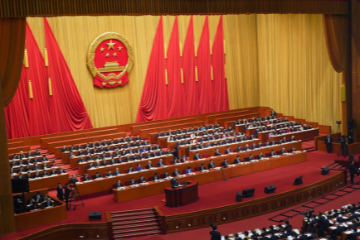
The optics of sit-in protests by irate investors in various offices of one of China’s largest realty firms, Evergrande, and clashes between demonstrators and law-enforcement gave credence to a view that this was a huge challenge to the Chinese Communist Party. Beijing may not let a good crisis go to waste.
The company has become one of the most indebted entities with a burden of US $300 billion liabilities, which has decimated its credit rating and share price. Left in its wake are unfinished residential buildings and over a million home buyers who have partially paid for their properties. These developments have also sent shockwaves across the Chinese economy with a 9 percent plunge in prices of Chinese stocks—a new low since the global financial crisis in 2008—and bourses across the world.
Early on in his term, President Xi Jinping set out his priorities as tackling pollution, inequality, and financial risks. He reckoned that significant progress has been made with respect to the first two, but the challenge of cleaning the Augean stables of debt remained. The legacy of debt is closely tied to China’s economic model christened “international circulation” by researcher Wang Jian. Under this strategy, China would leverage its enormous workforce in the global production chain to pursue export-led growth. This was the guiding principle for China’s economic mandarins till the early 2000s. By 2015, China had a near monopoly in manufacturing of electronics and white goods with its factories putting together or producing nearly 80 percent of computers and air-conditioners, and 90 percent of mobile handsets. However, the “economic miracle” meant that China had to pump in more credit to maintain the same amount of output.
By 2015, China had a near monopoly in manufacturing of electronics and white goods with its factories putting together or producing nearly 80 percent of computers and air-conditioners, and
90 percent of mobile handsets.
Clash of two visions
As China liberalised its economy in the 1970s, “get rich is glorious” was the reigning credo; many quit their government jobs to explore a sea of business opportunities, which popularised the Mandarin expression ‘xiahai’ that literally means “going down to the sea”. It is in this political and social milieu, Xu Jiayin, in his 30s, quit his job to start the Evergrande Group in Shenzhen, which was then in the throes of frenetic construction activity. Jiang Zemin, who succeeded Deng, had built his base in the financial hub of Shanghai by substantially carrying forward economic reforms and greenlighting the entry of business people into the CCP. As Xu Jiayin’s fortunes rose, so did his connections with the CCP elite. Xu was rated by Forbes as China’s wealthiest person in 2017.
Xu was mindful of giving them a slice of his fortune. In his book ‘Wen Jiabao: China's Greatest Actor’, Yu Jie alleges that former premier Wen Jiabao’s brother, Wen Jiahong had a stake in Evergrande, and had served as its director. Later, New York Times disclosed that Wen’s kin held hidden assets of US $2.7 billion, which China has denied.
Xu Jiayin, in his 30s, quit his job to start the Evergrande Group in Shenzhen, which was then in the throes of frenetic construction activity
 Source: Nikkei Asia
Source: Nikkei Asia
News of Xu’s purchase of a US $39 million property in a tony suburb in Australia next to that of then Vice-President Zeng Qinghong’s son, and news that he took a private jet to survey realty projects down under caused a stir. Xu’s property buys and his elite connections were not the only things making headlines. As member of the Chinese People’s Political Consultative Conference in 2012, Xu attended the ‘Two Sessions’ legislative proceedings sporting a belt crafted by a French luxury major; his picture went viral on China’s online platforms and this earned him a derisive epithet of ‘Belt Brother’ (see image).
While such confluence of business interests and the political elite may benefit a few in good times, they bring the political class disrepute when times get tough. The COVID-19 outbreak has put the spotlight on income inequality in the country. Amidst the yawning wealth gap in China, the CCP is also unhappy with the ostentatious lifestyle of such businesspeople. The CCP reckons that the business community has become a pressure group and is displeased with them airing views on policy matters. Last year, Ant Group had to shelve its US $35 billion IPO close on the heels of Alibaba’s co-founder Jack Ma’s critical comments on financial matters. In September, the CCP Politburo member Wang Yang marked the centenary of industrialist Sun Fuling. Amongst his other achievements, the Party specifically highlighted, was his role in rebuilding and nationalising industry amidst the ravages of the Chinese Civil war and financing the People’s Volunteer Army’s involvement in the Korean War against the West. In Xi’s era, the nation’s business icons follow in Sun Fuling’s footsteps, eschew limelight, contribute towards nation-building and society, and desist from flaunting riches.
In January 2021, a Politburo meeting to discuss the economy sought to ‘prevent disorderly expansion of capital’. Even as the term ‘disorderly expansion of capital’ has been mentioned on five occasions by Xi since then, it has been cited as a reason by the authorities to explain harsh measures against tech and online education majors. Thus, this ‘Red Reset’, exercise published prominently in the ‘People’s Daily’ in September, gives Xi a considerable degree of latitude when it comes to tackling financial risk in the Chinese economy, and coming to grips with the cronyism of his predecessors.
In Xi’s era, the nation’s business icons follow in Sun Fuling’s footsteps, eschew limelight, contribute towards nation-building and society, and desist from flaunting riches.
Home truths
Evergrande’s success in the arena of realty so far was closely linked to the obsession of the Chinese in parking their investment in real estate. As investment options in China are limited, property makes up for roughly 40 percent of household assets. An average urban household owns 1.5 residential properties and urban homeownership is the highest in the world. Shenzhen, hub of many technology companies, has announced curbs on realty purchase. Shenzhen’s home prices jumped 11.4 per cent in the first half this year in spite of the economic slowdown (see graph).
 Source: South China Morning Post
Source: South China Morning Post
Under the new rules, residents with “Hukou” in the city will only be allowed to buy a home if they have held the local household registration document for more than three years. Xi realises that speculation in real estate is hurting China’s growth trajectory as housing in places like Shenzhen becomes expensive, it has a cascading effect on wages, which blunt China’s competitive advantage. High living costs also limit family size, which hurt China’s future prospects. Experts have mooted levying property taxes on people buying multiple homes.
Since the pandemic, Xi has signalled his intent to move to a new development pattern—dual circulation. Xi wants innovation to power the nation’s future economic development, rather than the transient booster of the realty sector. Thus, Beijing has indicated its reluctance to bail out Evergrande, and to plug any adverse social reverberations by directing local authorities to negotiate with state-owned developers to take over unfinished real-estate projects. It is the foreign creditors who will bear most of the brunt of the collapse. Meanwhile, efforts are also underway to provide more investment avenues to the people, with the plan to inaugurate a stock exchange in Beijing. Xi announced that the share market in the capital would benefit technology-oriented innovation driven firms.
Mainland China has two major markets based in the Shanghai financial hub and Shenzhen. The Evergrande episode unfolded over a prolonged holiday in China to mark the Mid-Autumn Festival. During this time, Beijing maintained silence on the loan-default row causing stock indices to tumble across the globe’s bourses. Thus, for Xi, l’affaire Evergrande serves many purposes. First, it sends the message about how entrenched China is in the global system, and how it has the potential to hurt economic recovery of other nations. Second, it strikes at the core of the economic patronage networks of the ancien régime. Third, it signals that Xi is serious about changing its economic development strategy, and funnel capital into real technology innovations, and its social policies.
Xi wants innovation to power the nation’s future economic development, rather than the transient booster of the realty sector. Thus, Beijing has indicated its reluctance to bail out Evergrande, and to plug any adverse social reverberations by directing local authorities to negotiate with state-owned developers to take over unfinished real-estate projects.
The CCP will convene its once-in-a decade National Congress in 2022. Xi Jinping has indicated that he plans to stay on for a third consecutive term, which is without precedent in recent history. By striking a blow to patronage networks of the past, he strengthens his own position vis-à-vis any challengers or factions. To stay on in power longer, he needs to showcase a stronger report card, and, thus, he will be able to use “successes” like reining in private corporations to make his case.
 Source: The Print
Source: The Print
There are lessons from the Evergrande imbroglio for Indian policymakers too. Following the Galwan clash on the Sino-Indian border, there were calls to boycott Chinese merchandise. Exports and imports between India and China increased at over 65 percent between January and June this year. China remains India’s second largest export market, and efforts must be made to reduce our dependency on it since the former can always weaponise this reliance.
Infographic: Evergrande
- Evergrande, one of China’s largest realty development firms, began operations in 1996 in Shenzhen.
-The company booked 507.2 billion yuan (US $78.4 billion) in revenue in 2020.
- The Chinese Communist Party feted Evergrande founder Xu Jiayin as an “outstanding private entrepreneur” in 2018.
- Evergrande owns football team Guangzhou FC, and diversified into theme parks to electric vehicles.
- The company has become one of the most indebted entities with a burden of US $300 billion liabilities.
The views expressed above belong to the author(s). ORF research and analyses now available on Telegram! Click here to access our curated content — blogs, longforms and interviews.







 PREV
PREV


